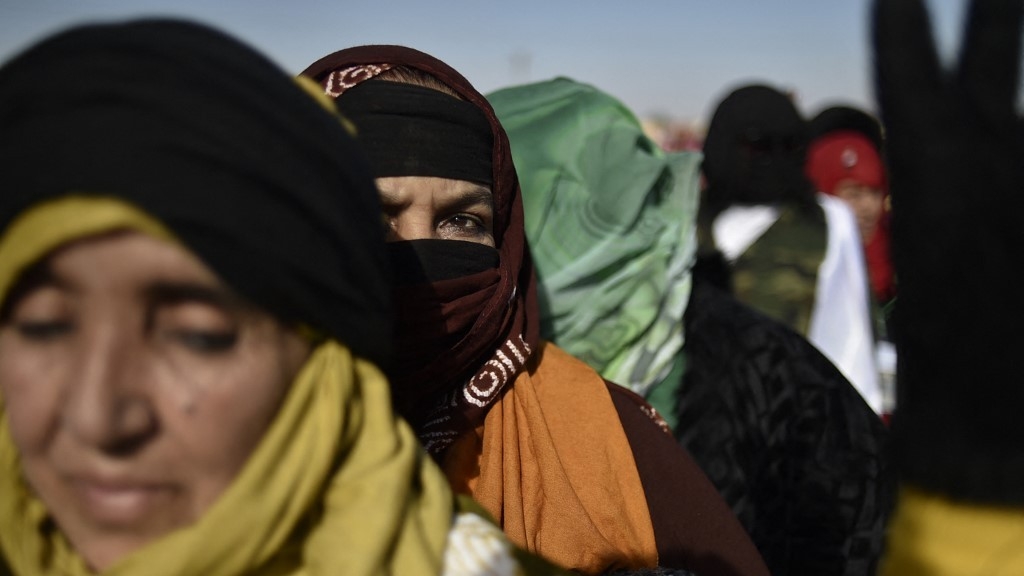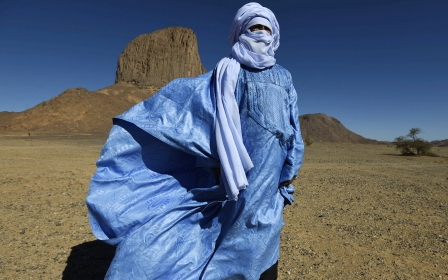Morocco accused of using Israeli weapons to kill civilians in Western Sahara

The French daily L’Humanité on Wednesday published an investigation revealing that Morocco killed dozens of civilians, including children, in Western Sahara using Israeli weapons.
Morocco controls 80 percent of the disputed territory of Western Sahara, and proposes an autonomy plan under its sovereignty. The Sahrawi independence movement of the Polisario Front, supported by Algiers, demands a self-determination referendum as recommended by the UN.
The UN considers Western Sahara a "non-self-governing territory".
The US recognised Moroccan sovereignty over the territory in 2020 in exchange for Rabat’s normalisation of ties with Israel. Israel recognised Morocco’s sovereignty over Western Sahara last year.
In 2020, Rabat launched a military operation against the territory to "put an end to the serious provocations" of the Polisario Front.
Stay informed with MEE's newsletters
Sign up to get the latest alerts, insights and analysis, starting with Turkey Unpacked
For nearly four years, the Sahrawis have regularly reported clashes and often claim to have inflicted human losses on the Moroccan side, but this has never been confirmed by Moroccan authorities.
Incidents are regularly reported by the Sahrawis, who assert that their lands "are confiscated" and their properties "set on fire".
According to L’Humanité, Morocco in October used Israeli-made drones from the military base at Smara airport, a city of over 66,000 inhabitants under Moroccan control.
The drones, the newspaper said, are Hermes 900 strategic reconnaissance drones and Hermes 450 tactical drones, capable of being equipped with air-to-ground missiles. The two models are developed by the Israeli manufacturer Elbit Systems.
In July, the Intercept reported similar information through Federico Borsari, a researcher specialising in unmanned technologies at the European Policy Analysis Center.
According to Borsari, Morocco was in possession of 150 vertical take-off and landing drones (including WanderB, ThunderB, and the kamikaze drone SpyX produced by the Israeli company BlueBird Aero Systems), three Heron TPs, and Harop ammunition produced by Israel Aerospace Industries, as well as four Hermes 900 drones produced by Elbit Systems.
He also specified that Morocco had Turkish Bayraktar TB2 drones and Chinese Wing Loong drones, both used for combat purposes.
The Moroccan Air Force also announced to Reuters in 2020 that it would acquire US MQ-9B SeaGuardian drones.
"The gridlock of the areas under the control of the Polisario Front by these killer aircraft has resulted in emptying the liberated territories of the nomads who lived there," L’Humanité reported. It added that drones target both humans and animals, and since 2021, 170 civilians have been hit, including 86 killed, among them two children.
Israeli drone factories
Since the normalisation of relations between Israel and Morocco in 2020, the two countries have concluded cooperation agreements, particularly in defence.
The then Israeli defence minister, Benny Gantz, was warmly received in Rabat in November 2021 for the signing of a "unprecedented" security cooperation agreement – the first of its kind with an Arab country, according to the Israeli side – aiming to facilitate Morocco's acquisition of technologies from Israel's powerful military industry.
'Barely a few hundred nomads still resist. The others have had to abandon their herds to join refugee camps or retreat to Mauritania'
- Abdeslam Omar Lahsen, Association of Sahrawi Prisoners
With this memorandum of understanding, the defence ministries and the armed forces of both states can also more easily engage with each other and share information, whereas this type of communication was previously only possible through their respective intelligence services.
In 2023, Shai Cohen, head of the Israeli liaison office in Rabat, announced the opening of two drone factories in Morocco by Elbit Systems.
The Israeli diplomat indicated that one of the two industrial sites should be located in Casablanca, without providing further details.
"A policy of ethnic cleansing is gradually taking hold," Abdeslam Omar Lahsen, president of the Association of Sahrawi Prisoners' and Disappeared Families, told the French daily, estimating that nearly 30,000 people have been forcibly displaced in the past three years due to Moroccan attacks.
"Barely a few hundred nomads still resist. The others have had to abandon their herds to join refugee camps or retreat to Mauritania."
*This article is a translation from French.
Middle East Eye delivers independent and unrivalled coverage and analysis of the Middle East, North Africa and beyond. To learn more about republishing this content and the associated fees, please fill out this form. More about MEE can be found here.





